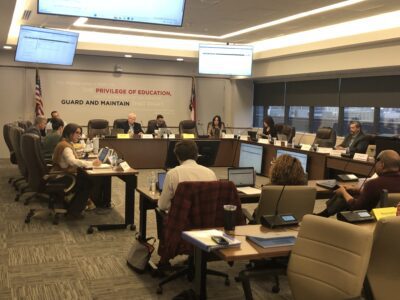
|
|
The North Carolina Charter Schools Review Board (CSRB) approved renewals for four public charter schools at its virtual meeting on Monday, Feb. 10. The CSRB delayed its vote on a fifth charter renewal until March, in order to hear from school leaders about financial management issues outlined in an audit report.
The CSRB also voted to allow two existing charter schools, STARS Charter and Tillery Charter Academy, to open new remote charter academies in the fall. Recent legislation, enacted in the 2023 state budget, gives charter schools the option to apply to operate remote academies.
Now, seven charter schools, including STARS and Tillery Charter, are poised to operate remote charter academies in fall 2025, according to the Office of Charter Schools (OCS). Five schools launched their remote academies last fall in the state’s inaugural cohort. The number of remote charter academies could increase further next month, as two more charter schools are scheduled to request CSRB approval for remote academies. Two fully virtual charter schools also operate in North Carolina, North Carolina Virtual Academy and North Carolina Cyber Academy.
“It’s the wave of the future,” Wesley Graner, the executive director of STARS Academy, said of remote learning during his interview with the CSRB.
Sign up for the EdDaily to start each weekday with the top education news.
An updated financial review
The CSRB delayed votes on the five renewal schools at its meeting last month, to allow time for additional review or submission of late audit reports. Jennifer Bennett, senior director of school business services at the Department of Public Instruction (DPI), provided members with an updated financial review on Monday prior to voting.
Her review on Monday cleared both schools recommended by OCS for 10-year renewal placements. Doral Academy, Bennett said, was “no longer a concern.” While Washington Montessori had not yet submitted its audit report, the school had a “healthy fund balance” and did not need its renewal held up, Bennett said.
The three other schools recommended by OCS for three-year placements still warranted monitoring, Bennett said. Lakeside Charter Academy’s revised audit shows reduced financial concerns, she said, but the school’s expenses have exceeded revenue for three out of the past four years. According to Bennett, rent under the school’s new facility agreement is equal to 25% of revenue.
“A lot of charter schools have capital obligations that take a significant part of their operating funds,” Bennett told the CSRB.
In North Carolina, charter schools do not receive any facility funds from the state.
At United Community School, expenses also exceeded revenue. The school’s reduced fund balance was partially due to an unsuccessful land acquisition, Bennett said, and the school had responded to corrective action.
However, the final renewal school, Movement Freedom, raised substantive concerns, Bennett said. Movement’s audit revealed a number of areas of non-compliance, with main findings “related to fiscal management,” Bennett said.
“My next step is to provide these audit findings to our other divisions that may be impacted,” she said.

During voting, the CSRB approved 10-year renewals for Washington Montessori and Doral Academy, along with three-year renewals for Lakeside Charter Academy and United Community School. However, board members expressed concerns about voting on Movement without first hearing from school leaders.
“This audit brings up a lot of questions for me,” said CSRB vice-Chair John Eldridge. “I do think that the board of this school needs to give us some sort of explanation one way or the other.”
The CSRB elected to delay Movement’s vote until March, with plans to hear from school leaders at that meeting.
Bennett also shared an update on Community School of Digital and Visual Arts (CSDVA), the school the CSRB voted last month to close. CSDVA still had not submitted its audit report, she said.
The school has since appealed the CSRB’s decision to the State Board of Education. Statute requires the State Board to issue a written decision within 60 days of an appeal.
New remote charter academies
As mentioned above, at least two new remote charter academies will launch during the 2025-26 school year.
Four charter schools applied by this year’s Jan. 15 deadline to open remote charter academies, per DPI. On Monday, the CSRB interviewed leaders from STARS Charter and Tillery Charter Academy, and the other two schools have interviews and voting scheduled for next month.
In his presentation to the CSRB, Graner, the STARS director, emphasized the need in his region for remote learning options. STARS currently serves 884 K-12 students from five counties, with over 500 students on a waitlist.
The addition of a remote academy would enable STARS to serve 134 more fourth-ninth grade students in the first year, Graner said. STARS plans to use the Edmentum platform to provide instruction, he said.

Providing expanded choice is a key catalyst for STARS’ remote academy, Graner said.
“We certainly want to provide choice as we always have, and also options,” he said. “I also want to offer opportunities for my teachers.”
The CSRB asked how the school’s partnership with Edmentum would work.
“If you have technical difficulties while students are going through lessons, will Edmentum offer IT support right away?” CSRB member Hilda Parlér asked.
Graner assured the CSRB that Edmentum would offer prompt support. The platform already has a track record of working with some North Carolina public schools, he said.
One CSRB member listening to the presentation had just launched a remote academy this year. CSRB Chair Bruce Friend, the head of school at Pine Springs Preparatory, secured approval to open a remote charter academy in 2024, as part of the state’s initial cohort. He and other state charter leaders recently hosted state Superintendent Mo Green at Pine Springs for a school visit.
Friend had both questions and advice for Graner. Edmentum, he said, provides “the backbone for the North Carolina Cyber Academy,” one of North Carolina’s two fully virtual charter schools. Still, Friend encouraged Graner to establish clear expectations around technical support, grades, testing, and more.
“Don’t leave any stone unturned” in delineating responsibilities with Edmentum, he advised.
The second remote academy applicant, Tillery Charter, plans to operate on a much smaller scale than STARS, enrolling 15 students in sixth-eighth grades during its first year. Tillery currently serves 231 K-6 students from eight counties at its brick and mortar location.
The school plans to use its own teachers and curriculum for the remote academy, said Teresa Barber, Tillery’s founding principal, adding five remote students with each successive year.

Alleviating the transportation burden for families is a key driver behind Tillery’s application, according to school leaders. In a cover letter submitted to the CSRB with school materials, Tillery leaders said some families drive nearly an hour and a half to get to school.
CSRB member Stephen Gay asked Barber about the level of school support and teacher buy-in required to implement the remote academy.
“This can be all done in-house — no third party support? Your teachers are open to this?” he asked.
Barber affirmed the model’s viability and teacher support.
“I think this would just be very beneficial for the community and the students and the families that we’re reaching,” she said.
During CSRB’s discussion, Friend expressed optimism about Tillery’s model and prospects for innovation.
“I hope they’re successful with it,” he said. “This has the makings of being a test case for a small virtual academy that is done completely in-house.”
But CSRB member Eric Sanchez voiced caution about the school’s readiness to expand. Citing Tillery’s academic growth and performance data, which included a D grade in 2023-24, he asked, “You look at something like that, you wonder, why give permission to spread their resources thinner by adding a whole [other] program when the current program… seems to be struggling or just isn’t thriving as of yet?”
Discussion also revealed a need for clarification in the law establishing remote charter academies.
“When you get an approved remote academy, it’s getting its own renewal length that can be separate and different from your traditional charter,” Friend said. “What we need to look at is marrying that up… The remote academy is not its own charter, but in some ways, we’re treating it as though it is.”
Here’s the section of the law outlining remote charter academy renewals.

STARS Charter received unanimous support from the CSRB for its remote academy. Six CSRB members voted to approve Tillery Charter’s application, while three — Eldridge, Sanchez, and Alex Quigley — voted against it.
Amendment requests
During Monday’s meeting, the CSRB also approved amendment requests from two schools currently in the Ready-to-Open process.
GO BIG, a Charlotte-based, all-girls charter school, sought permission to relocate and decrease enrollment. Unable to find a suitable facility in its target zip code, GO BIG planned to shift to a smaller facility, school leaders said. The change will require a decrease in first-year enrollment from 300 K-2 students to 150.
School leaders expressed optimism about filling slots, however. GO BIG has received 37 applications so far, with a lottery scheduled for mid-March. If a larger facility can be secured, school leaders expect two moves within two years.
“Our hope is that we find our permanent site,” said Crystal Howe, GO BIG’s head of school.
The second amendment request — for a third-year delay — came from West Triangle High School. Originally slated to open in August 2023, the school now hopes to open in fall 2026. Facility setbacks have caused the delays, said Joey Webb, executive director at WTHS.
“It is a cycle of disappointment every time we have to go through a delay,” he said.
Originally, WTHS contracted with a construction company to build a charter high school in Hillsborough, but the Orange County Board of Commissioners denied the school’s rezoning application. WTHS then secured a long-term rental elsewhere in Hillsborough, but that lease was terminated.
“This has been some sort of saga,” Eldridge said. “What has the school been doing to continue to ensure interest? It seems like it’s a moving target.”
Interest form submissions are coming in weekly, Webb said. WTHS also has articulation agreements with The Expedition School and Alamance Community School.
In addition, the school now has access to start-up funds and facility consultants through Great Schools NC. The group recently awarded WTHS a $350,000 two-year start-up grant, Webb said, which will be paid out in three installments beginning March 1.
Still, CSRB members wondered how a potential relocation for WTHS might impact articulation agreements, while also allowing the high school to maintain a diverse array of feeder middle schools.
“I originally wrote this charter,” said Quigley, who is no longer on the school’s board. “Part of the vision of it was to not have all the students being articulated and to have an open enrollment high school that drew kids from multiple middle schools.”
WTHS, Quigley said, was originally a replication of Research Triangle High School, which enrolls students from 40 different middle schools. “Does that remain part of the vision?” he asked.
“We are very committed to that as a function of our school’s identity,” Webb said.
While the CSRB’s decision gives WTHS more time to find a facility, Webb said the school would likely fold if that task has not been completed by June 1.
“We want another six months to keep going and then see where we are,” he said.
Update on schools with stipulations
Finally, the CSRB also heard an update from three schools that had their charters renewed in 2023 with stipulations. All three schools — Paul R. Brown Leadership Academy, Monroe Charter Academy, and Rocky Mount Prep — are up for renewal in 2026.
Their 2023 renewals were contingent upon taking certain steps, such as developing improvement plans, conducting leadership and teacher training, meeting growth, and ensuring compliance.
In his presentation to the CSRB, Jason Wray, the superintendent of Paul R. Brown Leadership Academy (PRBLA), outlined numerous actions the school had taken to address academics, training, and compliance. PRBLA met academic growth expectations in both 2023 and 2024.
“I’m impressed with the overall improvement,” Parlér noted.
Camela Ford, Monroe Charter’s principal, also updated the CSRB on her school’s improvement plans. While Monroe Charter did not meet growth last year, the school has implemented board, administrative, and teacher training, and has no legal or financial compliance issues, she said.
CSRB member Shelly Shope commended school leaders’ progress and focus on holding people accountable.
“You can tell that you guys are moving and growing in the right direction,” she said. “Keep pushing forward.”
During Rocky Mount Prep’s presentation, school leaders emphasized instructional enhancements, interventions, and monitoring. However, the school has not met growth for the past two years. School leaders cited student attendance and learning gaps as ongoing challenges.
Two other stipulation schools —Z.E.C.A. School of the Arts and Technology and Next Generation Academy — will present to the CSRB in March. Another stipulation school, Apprentice Academy, closed last fall.
The CSRB meets next on March 10.
Editor’s Note: EdNC has retained Kristen Blair to cover the monthly meetings of the Charter Schools Review Board in 2025. Kristen currently serves as the communications director for the North Carolina Coalition for Charter Schools. She has written for EdNC since 2015, and EdNC retains editorial control of the content.
Recommended reading




